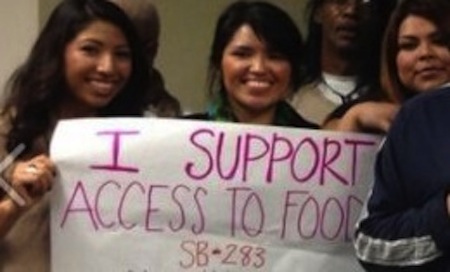Take action! Reverse California’s unjust ‘food stamps’ policy and support the right to food for ex-offenders

The human right to food arises from a fundamental human need. Yet, the State of California disqualifies, for life, people with drug felony convictions from receiving food stamps. Human rights advocates in California, including NESRI ally, the Los Angeles Community Action Network, need our help today. SB 283 is a bill that will reinstate CalFresh (food stamp) benefits for Californians with prior drug-related felony convictions, provided they are following program rules and have successfully complied with the conditions of their probation or parole. Of course, no condition other than need should be applicable when it comes to the receipt of food stamps. Nevertheless, this bill would reinstate benefits to a significant number of individuals and families impacted by this draconian law.
SB 283 is currently in the California Assembly Appropriations Committee "suspense file" and must get out of committee before the end of August. Today, Tuesday, August 20th, people from across California are calling Assemblymember Mike Gatto, Chair of the Committee, to ask him to move SB 283 off suspense so that it can be voted on by the full Assembly. With over 150 organizations in support, including CA Probation & Parole Officers Association, LA Times & NY Times – SB 283 has broad support across the state.
In June this year, in relation to the food stamps amendments to the Farm Bill, we said:
“…one in six people in the United States is experiencing food insecurity, which means that they cannot afford adequate food. Of the approximately 50 million individuals impacted by food insecurity, 17 million are children and 17 million have very low food security, which means they have to skip meals, reduce the size of their meals or even go without eating for an entire day. The United States’ current food assistance programs, which includes SNAP, already fails horribly to address the roots of the food crisis and provides only nominal relief to just over half of the people experiencing food insecurity within the country's borders.”
Given that one in six people in the U.S. are experiencing food insecurity and are not getting access to the nutrition they need (and only one in eleven get the bare minimal assistance offered by food assistance programs), to add to an already horrific situation through any further exclusion of people in need of food is unconscionable. Reversing this law will not end California’s food insecurity problem, but will be a step in the right direction and ensure more people in the richest country in the world have access to food.
Please help by calling in today. Organizers and advocates in California have been mobilizing on the ground on for many months now. They are asking us to contact representatives today in the following way:
- If you live in LA, call Assemblymember Gatto’s LA office at (818) 558-3043.
- If you live outside of LA, call his Sacramento office at (916) 319-2043.
- If you are represented by Raul Bocanegra, Steven Bradford, Ian Calderon, Isadore Hall, or any other member on the Appropriations Committee, use this list to contact your Assembly Member.
You can use the suggested script below to make a very quick call:
“Hi, my name is _____ and I’m calling to ask Assemblymember Gatto [or insert name of other Assemblymember] to pass SB 283.
I support this bill because _____”
In offering your brief explanation of why you support the bill, you could use one or more of the following points:
- Human rights – including the human right to food – apply to all people, including ex-offenders. No-one should be excluded from access to food.
- We can prevent hunger by restoring federal food benefits to people returning to the community after a felony drug conviction by passing SB 283.
To read more about the farm bill and food stamps click here and here.
A recent report on food security, Nourishing Change: Fulfilling the Right to Food in the United States, released by the Center for Human Rights and Global Justice at New York University can be found here.
Further information on the Right to Food can be found here.
